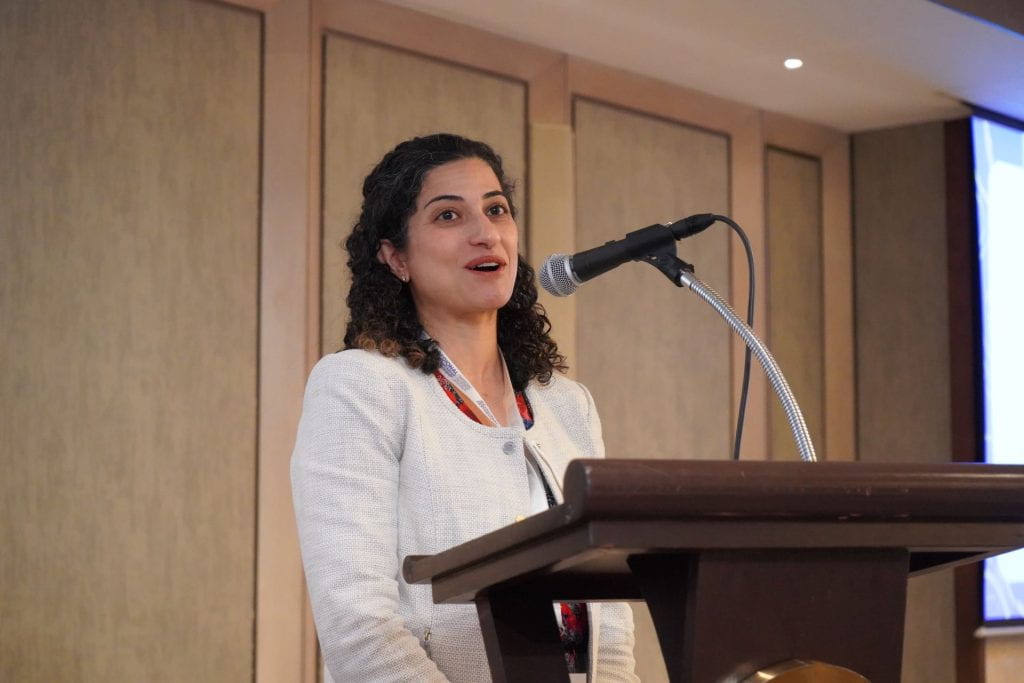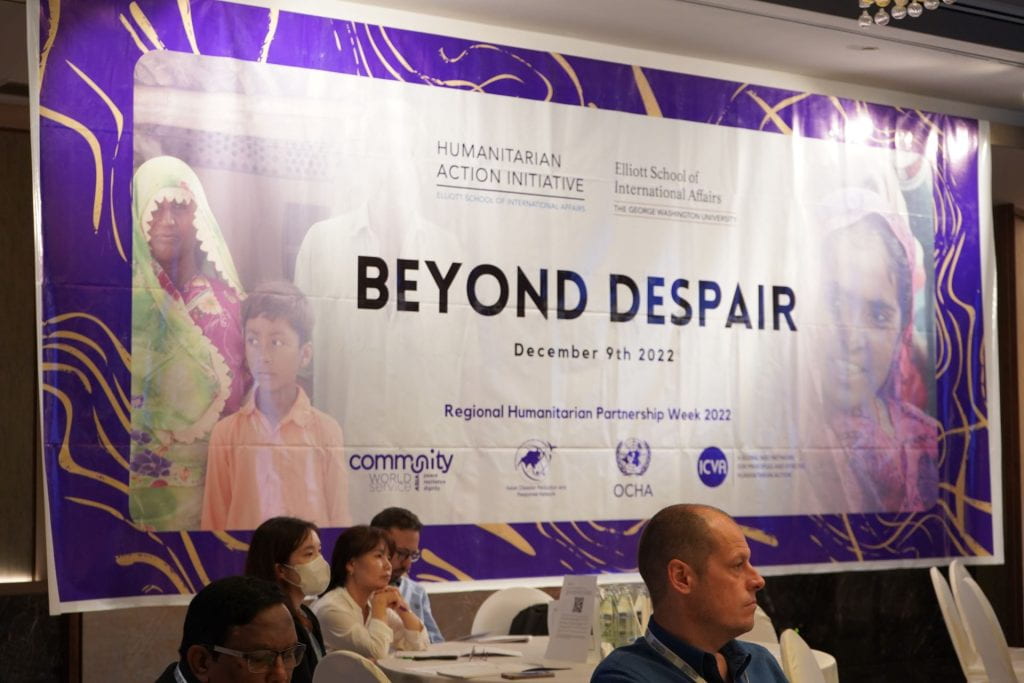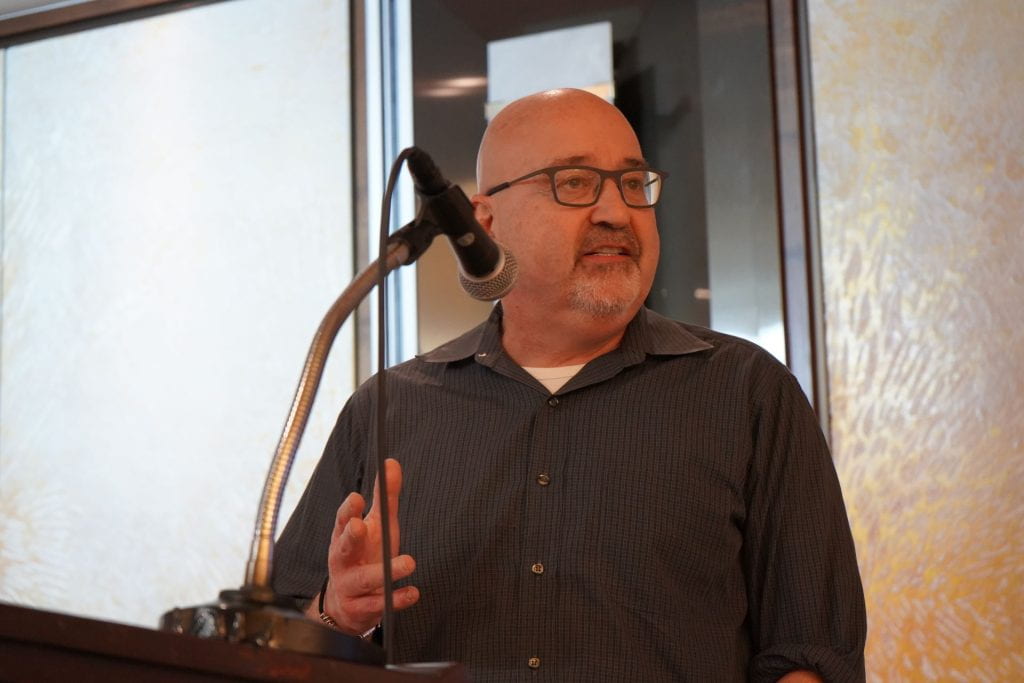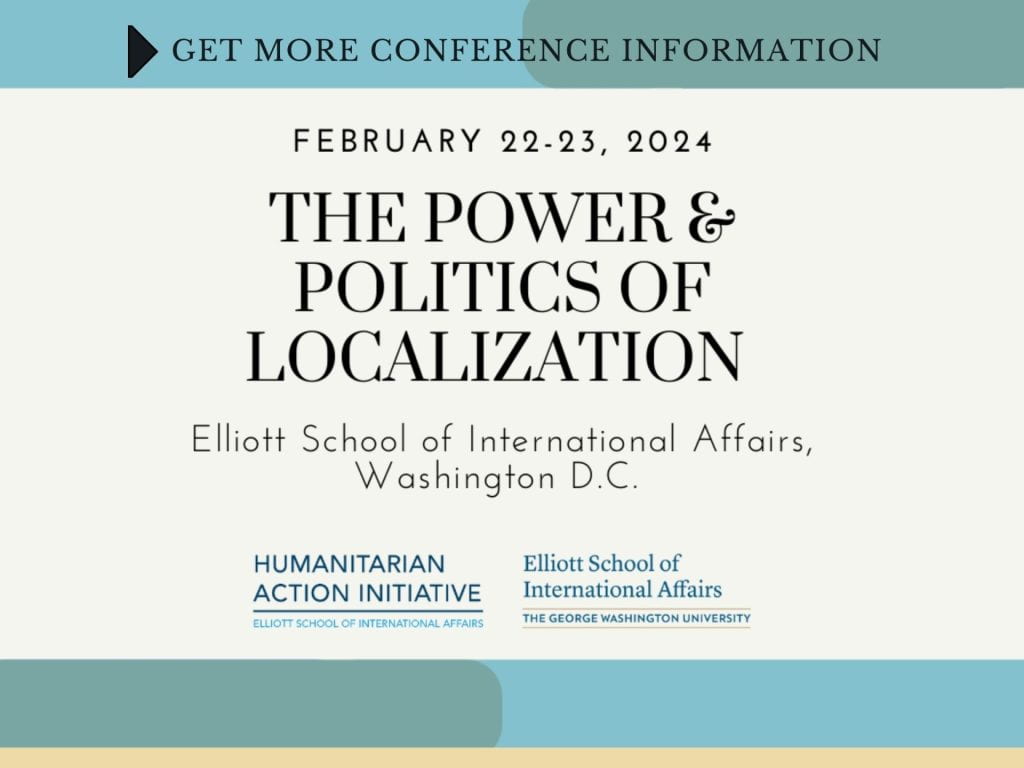LOCALIZATION
Localization is a policy commitment and reform process with the goal of shifting power and resources to local and national actors and supporting and strengthening the existing leadership, capacity, and expertise of local and national first responders. The World Humanitarian Summit and Grand Bargain (2016) reignited commitment to making humanitarian action as “local as possible, as international as necessary.” Our inaugural research project focuses on localization.
RESEARCH
The Power and Politics of Localization, February 22-23, 2024, Elliott School of International Affairs, Washington D.C., USA
Calls to “reimagine aid,” “shift the power,” and “decolonize aid” express frustration with systems of humanitarian and development assistance that are dominated by actors from the Global North and lack participation from local communities affected by these policies. In various domains of global governance, major reform movements consider how to meaningfully devolve decision-making power and resources from global institutions to local communities. This “localization turn” raises a few important conceptual and practical questions. How is localization understood by scholars, practitioners and local communities themselves? How is localization practiced and to what effects? What does localization reveal about how power and agency are constituted in global governance? This conference, convened by the Humanitarian Action Initiative (HAI), an academic and research hub housed in the George Washington University’s Elliott School of International Affairs, will engage in a critical interrogation of the localization agenda; evaluate the ongoing efforts to implement localization policy; analyze the underlying power relations and dynamics in humanitarian and development assistance; discuss points of contestation and resistance; and consider localization’s broader impacts. Read more.
PUBLICATIONS
Deloffre, Maryam Z. (2023). “How Germany can make a more ambitious commitment to localization in its humanitarian strategy.” Berlin: Centre for Humanitarian Action (CHA).
Beyond Despair Conference Report (2022). Conference organized by Community World Service Asia in collaboration with the Humanitarian Action Initiative of the George Washington University and the Regional Humanitarian Partnership Week Asia partners.
Fnu, Susana* (2021). “How Covid-19 has catalyzed local innovation,” Humanitarian Practice Network (HPN) Blog: Overseas Development Institute, June 15, 2021. *Master’s degree candidate at the Elliott School.
Barnett, Michael (2021). “Humanitarian organizations won’t listen to groups on the ground, in part because of institutionalized racism,” The Monkey Cage, The Washington Post, June 8.
Kaisi, Jihan, Rosy Haddad, Loujine Fattal and Alina Potts (2021) “Localizing knowledge generation during a pandemic to make distributions safer,” in Localization and Local Humanitarian Action, Humanitarian Exchange: No. 79, May, pp. 105-109.
LEARNING
IAFF 6138.23 Locally-led Humanitarian Action, Maryam Z. Deloffre, Spring semesters
When we think about and imagine humanitarian assistance, we often envision international actors like the Red Cross, United Nations (UN) agencies, or non-governmental organizations (NGOs) flying in to provide life-saving aid to communities affected by conflict and natural and climate-related disasters. Yet, the majority of humanitarian workers are neighbors and community organizations living and working in crisis settings. Our approach in this course will be to examine humanitarian action from the perspective of local, national, and regional actors working in crisis settings. What do non-Western systems of humanitarian assistance look like and what norms, principles, and practices do they emphasize? How do local systems interact and intersect with global humanitarian assistance? What can we learn from South-South cooperation on humanitarian assistance? What role do donors from the Gulf States and BRICS play and to what extent do they engage with norms, standards and systems of “good donorship”? We will also consider the significant reform movement undertaken by the signatories of the UN’s Grand Bargain which articulates the vision to make humanitarian action “as local as possible, as international as necessary.” Localization refers to putting local actors and crisis- and conflict-affected populations at the center of global humanitarian action and involves major reforms in the areas of financing, partnerships, capacity-building and coordination. The UN and major humanitarian donors like the U.S. have expended a considerable amount of resources into meeting localization targets. We will examine the multi-dimensional nature of localization and analyze factors that impede and enable its full realization.
Honors 2047.11 Humanitarian Governance and Localization, Michael Barnett, Spring 2021
This course focuses on localization. We begin by exploring how the humanitarian architecture got this way. There is a long history behind this development, starting with colonialism and imperialism, missionary work, development and public health. This hierarchy and centralization became more formalized beginning in the post-Cold War period, building on past advantages and driven by donors, political economy, and the attempt by aid agencies to get better at what they do. Within a few years the aid world became defined by a well-nourished northern sector and a resource-starved southern sector, which parallels the distribution of power and authority. In response, many aid agencies began agitating for reform.
We will examine three issues related to the barriers to localization. The first is whether the well-off have kept to their pledges and promises. At the WHS the largest donors and NGOs made various commitments, but have they followed through? The second is an examination of which aspects of localization are most important to southern NGOs. Everyone wants reform, but some reforms are more important to some NGOs than they are to others. The third is a more wide-ranging consideration of the obstacles to localization, including competition over resources, perceptions of competence, and institutionalized racism.
We then examine two contemporary issues – the shrinking humanitarian space and COVID-19 –that are likely to affect the prospects of localization and whether localization can deliver on its promise of a more effective and legitimate humanitarianism.
POLICY
Beyond Despair
December 9, 2022
Michael Barnett, University Professor of International Affairs and Political Science, and Maryam Z. Deloffre, Associate Professor of International Affairs and Director, Humanitarian Action Initiative, co-hosted, with Community World Service Asia (CWSA), a half-day conference, “Beyond Despair,” at the Regional Humanitarian Partnership Week (RHPW) meetings in Bangkok, Thailand. The RHPW is organized by Asian Disaster Reduction & Response Network (ADRRN), CWSA, the International Council of Voluntary Agencies (ICVA) and the United Nations Office for the Coordination of Humanitarian Affairs (UNOCHA) and is the largest gathering of humanitarian actors in the region. In Beyond Despair, Barnett and Deloffre focused on the positive–how do humanitarian actors leverage their creativity and pragmatism to provide aid despite access challenges and structural barriers? Professor Barnett presented data from a survey conducted last year with Smruti Patel of Global Mentoring Initiative (GMI) and Political Science Ph.D. student Alex Vandermaas-Peeler, on the nature and sources of structural barriers – racism/colonialism embedded in attitudes and institutions, funding (and lack thereof), access constraints etc. Professor Deloffre then led a discussion on how humanitarian actors bypass these barriers to provide life-saving assistance. Over 250 practitioners, policymakers and academics from Asia, the Middle East and Africa attended the session.
Read the Beyond Despair conference report.




